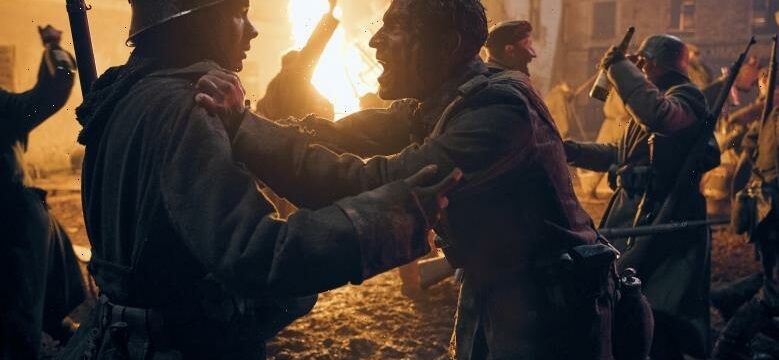In the season of the spectacle, the Oscar craft nominations are pretty evenly split, led by “Elvis” and the late-surging “All Quiet on the Western Front” with six. Other leading craft contenders, including “Avatar: The Way of Water” and “Top Gun: Maverick,” top out at three nominations each — a tally those summer blockbusters share with “Babylon,” “The Batman,” “Black Panther: Wakanda Forever,” and “Everything Everywhere All at Once.” “The Banshees of Inisherin,” “The Fabelmans,” and “TÁR” (all in the running for Best Picture alongside “Avatar”, “Everything Everywhere,” and “Top Gun”) are nominated for two craft awards a piece.
This was definitely the result of an unusually competitive field containing three sequels (“Avatar,” “Top Gun,” and “Black Panther”), a DC reboot (“The Batman”), a World War I actioner (“All Quiet”), a multiverse adventure (“EEAAO”), an epic Hollywood comedy-drama (“Babylon”), and a musical biopic extravaganza (“Elvis”). So competitive, in fact, that Jordan Peele’s disruptive sci-fi/horror film, “Nope,” got ignored completely, despite the innovative work of cinematographer Hoyte van Hoytema and sound design by supervising sound editor Johnnie Burn, which both topped IndieWire’s Best Cinematography and Best Sound of 2022 lists.
Edward Berger’s acclaimed anti-war epic “All Quiet” dominated the Oscar shortlists and BAFTA nominations alike on its way to becoming this morning’s biggest craft surprise, receiving nominations in every category it was shortlisted for: VFX (production visual effects supervisor Frank Petzold taking a naturalistic approach led by James Friend’s principal photography), score (nearly atonal music that reflects the soldiers’ emotional state and the film’s horror movie vibes, courtesy of Oscar nominee Volker Bertelmann), makeup/hairstyling (with makeup and hair designer Heike Merker emphasizing blood and mud), and sound (a sonic relationship with the war machine from sound supervisor/sound designer Frank Kruse, co-sound designer Markus Stemler, and re-recording mixer Lars Ginzel). It adds to that total nods for Friend’s immersive cinematography and the production design of Christian M. Goldbeck and Ernestine Hipper.
Baz Luhrmann’s delirious “Elvis” delivered on its breadth of crafts, tying the six craft nominations for the director’s “Moulin Rouge.” “Elvis” is nominated for cinematography (with Mandy Walker becoming only the third woman to be recognized by her branch), production design (co-supervised by two-time Oscar winner Catherine Martin and Karen Murphy), costume design (two-time Oscar winner Martin), makeup/hairstyling (led by two-time Oscar winning prosthetics designer Mark Coulier, prosthetics supervisor Jason Baird, and hair concept designer Aldo Signoretti), editing (Jonathan Redmond and Matt Villa), and sound (sound recordist David Lee, supervising sound editor Wayne Pashley, two-time Oscar-winning re-recording mixer Andy Nelson, and re-recording mixer Michael Keller).
While James Cameron’s “Avatar” sequel couldn’t match the original’s game-changing seven nominations, it excelled at its innovative VFX and world-building in expanding into the oceanic world of Pandora, while its state of the art dynamic and immersive sound obviously impressed the branch. The film staked nominations for VFX (led by four-time Oscar-winning senior supervisor Joe Letteri and Wētā FX), production design (Dylan Cole, Ben Procter, and set decorator Vanessa Cole), and sound (led by four-time Oscar-winning supervising sound editor/re-recording mixer Christopher Boyes and supervising sound editor Gwendolyn Yates Whittle).
With neither composer Ludwig Göransson or production designer Hannah Beachler returning to races they won for the first “Black Panther,” Ryan Coogler’s “Wakanda Forever” yielded mixed results: It didn’t equal the previous film’s number of nominations, yet it expanded its crafts reach with makeup/hairstyling and VFX. Oscar winner Ruth Carter — who broke the color barrier in her category — returned with a nomination for costume design. In addition, makeup artist Joel Harlow and hairstylist Camille Friend and the visual effects team led by Geoffrey Baumann and Craig Hammack — who were overlooked last time — received noms, too.
The high-flying global phenomenon “Top Gun: Maverick” was a major player as well — though not, surprisingly, for the amazing aerial photography overseen by Oscar winner Claudio Miranda. While it missed a cinematography nod, the sequel remains a frontrunner for editing (editor Eddie Hamilton) and sound (led by Oscar-winning production sound mixer Mark Weingarten, supervising sound editors James Mather and Al Nelson, and re-recording mixers Chris Burdon and Mark Taylor). Following a well-received presentation at the VFX “bake-off” earlier this month, the film also received a nomination for its supporting VFX (production supervised by Ryan Tudhope).
Matt Reeves’ “The Batman” stood out as a gritty, noirish procedural, and was recognized for its makeup/hairstyling (for Colin Farrell’s unrecognizable Oz/Penguin, courtesy of prosthetic makeup artist Mike Marino), VFX (production supervised by Dan Lemmon and boasting Wētā FX’s Batmobile chase and ILM’s pop-up StageCraft LED wall), and sound (customized for depicting Gotham and its superhero and villains, led by supervising sound editors William Files and Douglas Murray and re-recording mixer Andy Nelson).
A24’s Best Picture contender (and overall nominations leader) “Everything Everywhere All at Once” exceeded expectations with a surprise nod for its unconventional score by the experimental trio Son Lux. The indie breakout hit from the Best Directing and Best Original Screenplay-nominated duo of the Daniels (Daniel Kwan and Daniel Scheinert) was a tour de force in balancing the epic multiverse adventure with the intimate family saga. It also received noms for costume design (costume designer Shirley Kurata created an array of styles for the “verse jumping”) and editing (editor Paul Rogers carefully layered the bombastic with the mundane for Michelle Yeoh’s emotional arc).
“Babylon” turned out to be the most divisive film of the awards season, thanks to Damien Chazelle’s wild ride through Hollywood’s hedonistic excess during the Roaring Twenties. Yet it offered some of the most adventurous crafts. It’s been singled out for score (“La La Land” Oscar winner Justin Hurwitz created a unique jazz sound combining wailing trumpets, screaming saxes, and modern house beats), costume design (four-time nominee Mary Zophres weaved monumental period work that was audacious and primal), and production design (production designer Florencia Martin and set decorator Anthony Carlino).
Source: Read Full Article


